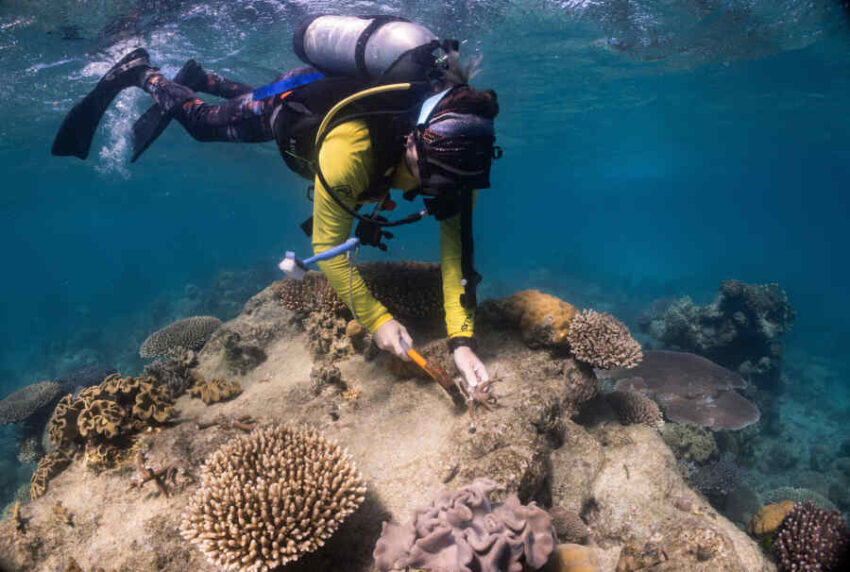Thursday, March 7, 2024

Today, Qantas and the Great Barrier Reef Foundation unveiled a pioneering initiative aimed at expediting the rejuvenation of Australia’s reef ecosystems. The initiative encompasses investments in Coral IVF programs, resilient coral strains, and innovative portable coral nurseries.
Marking a significant milestone in their longstanding 15-year collaboration, Qantas commits $10 million over the span of a decade to the Reef Restoration Fund. This fund will provide crucial support to scientists, Indigenous custodians, and local tourism operators engaged in coral restoration efforts spanning the Great Barrier Reef and other renowned Australian coral reefs.
Anna Marsden, Managing Director of the Great Barrier Reef Foundation, and Andrew Parker, Qantas Group’s Chief Sustainability Officer, announced this groundbreaking partnership at the Australian Institute of Marine Science’s National Sea Simulator in Townsville.
Ms Marsden said: “Australia is the guardian of some of the most iconic coral reefs in the world. It’s a huge responsibility and we’re proud to see one national icon supporting another. This partnership will help fund critical actions at a critical time.
“Coral reefs are the beating heart of our oceans. They’re a nursery and safe haven for a quarter of all marine life and support a billion people worldwide. But the Great Barrier Reef, and coral reefs around Australia and the world, cannot adapt fast enough to warming ocean temperatures, making them one of the most vulnerable ecosystems on the planet. We must help safeguard their future from the impacts of climate change.
“We’ve made more advances in coral reef restoration science in the past five years than we have in the past five decades. Over the life of the partnership we’re committed to finding opportunities to share these learnings with Australia’s other coral reefs.”
Mr Parker said the partnership is a key element of the national carrier’s Nature Action Plan, which launched today.
“Connecting our customers with natural landscapes is at the core of what we do, including carrying millions of people to the reef each year,” said Mr Parker.
“We know that aviation is a high emissions industry, which is why we were one of the first airlines globally to commit to net zero emissions by 2050. We want to take the same leadership in addressing our impact on nature so that future generations can enjoy all the opportunities that global travel offers for years to come.
“By establishing the Reef Restoration Fund with our trusted partner of 15 years, we’re helping accelerate the development of world-leading technologies and projects to restore some of our most critical ecosystems.
“It’s part of our commitment to address nature and biodiversity loss by reducing the impact of our operations and supply chain, supporting the broader restoration of nature and advocating for cross-sector transformation.
“These commitments are just the first step. We are also developing rigorous nature-related targets and plans on how we’ll achieve them, which we expect to release by the middle of next year,” added Mr Parker.
The Reef Restoration Fund aims to bolster ongoing efforts to restore the Great Barrier Reef while also funding research geared towards future coral regeneration. Over the initial two years, the Fund will finance several key projects:
Qantas Group’s Nature Action Plan represents a significant step forward in the airline’s commitment to fostering a nature-positive future, exemplified by its extensive partnership expansion with the Great Barrier Reef Foundation.
Aligned with this overarching strategy, the Nature Action Plan encompasses a thorough evaluation of the Qantas Group’s impact on nature, affirming its dedication to mitigating biodiversity loss across its operations, supply chain, and customer engagements.
In pursuit of its nature-related objectives, Qantas remains focused on establishing and achieving pertinent targets. By the middle of the upcoming year, the company intends to disclose information in accordance with the Taskforce on Nature-related Financial Disclosures.
Progress towards sustainability within the airline industry is evident through several initiatives:
Sunday, April 28, 2024
Sunday, April 28, 2024
Sunday, April 28, 2024